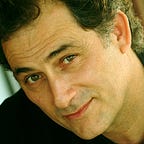I am Cause not Effect
We are so oblivious to cause and effect that it is rarely questioned, scrutinised or seen for what it is. Being either at the effect or at cause in life is a decision we unconsciously make as children. It is context as explained here that generates our experiences.
An article about cause and effect as it relates to living an empowered life.
Within this unprecedented 21st century current economic and political environment, I thought it would be very helpful to write an article on cause and effect and look deeper into its essence as it relates to healthy living, communication and life itself.
It is safe to assert that many of us have, at one point or another, found ourselves to be at the effect of someone or something. Real or not, concepts such as action-reaction, cause and effect and consequences are imbedded in our consciousness, but seldom discussed as to their origins, implications and applications inside our communication models or every day life.
To me, a context is the enveloping quality, state of mind or atmosphere that transparently contains the moment-to-moment events and happenings of our daily lives. It contains our views, opinions, perspectives, the colours and shapes of our thoughts, feelings, moods, actions, etc.
